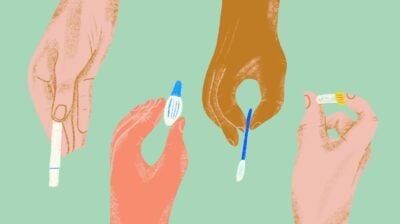Living with HIV
People living with HIV can live long, full, and healthy lives

There is a perception among some people today that HIV is no longer a problem, and that they’re unlikely to get it. Unfortunately, this isn’t the case. Yes, treatment for HIV has massively improved over the past number of years, but the virus itself is still common, and it’s still as important to look after your sexual, mental and physical health when living with HIV.
What is U=U?
HIV is passed through certain bodily fluids. This means that blood, semen, vaginal liquids, breast milk and secretions from the anus can all carry the virus. People living with HIV can take medication that will keep them healthy and prevents HIV from being passed on to their sexual partners. The medicine works by reducing a person’s viral load to an undetectable amount.
Undetectable means that the amount of HIV in the blood is so low that it was not picked up by the test. The person is still HIV-positive and must continue to take their medication but the treatment is so effective that they cannot pass on HIV to another person through sex. This breakthrough in HIV medicine is known as Undetectable equals Untransmittable or U=U.
What is a viral load?
Viral Load is a term used to describe the amount of HIV in the blood at any one time. It is determined by a blood test. The more HIV there is in the blood (a high viral load), the greater the risk of becoming ill because of a weakened immune system. With effective treatment, the viral load can be reduced to undetectable and damage to the immune system is stopped.
What treatment is used for HIV?
HIV treatment is a combination of antiretroviral drugs that aim to stop the virus from replicating in the body and allow the immune system to function as normal.
HIV treatment is now so effective for people living with HIV that the viral load can be reduced to undetectable and damage to the immune system is stopped. The term for this is undetectable viral load. An undetectable viral load normally means that the immune system together with HIV medication, are successfully controlling the replication of HIV in the body.
What does having an undetectable viral load mean?
The goal of effective treatment for people living with HIV is to reduce the viral load to an undetectable level. This means that they will not pass on HIV to their sexual partners even if they do not use condoms.
Having an undetectable viral load means that people living with HIV can feel confident that they will not pass on HIV to their sexual partners. People living with HIV face a lot of specific challenges that are related to the stigma surrounding the virus. The message of U=U can help to break down misinformation around HIV and help reduce stigma.
The message of U=U can help transform the lives of people living with HIV by:
- Eliminating concern about passing HIV on to partners
- Creating the opportunity to conceive by having sex
- Breaking down HIV stigma in the community, with medical professionals and for individuals
What if my viral load is not undetectable?
Regardless of a person’s HIV status, we are all equal. A person’s value is not measured by their viral load and no one living with HIV is a danger. If you are living with HIV and currently have a detective viral load you can still enjoy an active sex life without fear of transmitting HIV by using condoms.
Living with HIV and PrEP
If you are living with a detectable viral load PrEP can also be a prevention option for your sexual partners. PrEP is a medicine that is taken to reduce the chance of getting HIV. It works by having enough of the drug in your body that if you are exposed to HIV, it can block it before it has a chance to establish infection. Taking PrEP correctly is more than 99% effective at preventing HIV infection.
PrEP is now available for free in Ireland to people who are at a high risk of acquiring HIV. Read our article on PrEP to learn about who is entitled to free PrEP.
Facing challenges when living with HIV
People living with HIV face a lot of specific challenges that are related to the stigma surrounding the virus. It’s really important that everyone works to reduce the stigma around HIV, and support people living with HIV.
The treatment available now means that people living with HIV live long, full, healthy lives. They have love lives, sex lives, many friendships, and fulfilling careers, just like everyone else.
There are specific challenges people living with HIV do face, but lots of these are more on account the stigma and discrimination they may face than the virus itself. If you’re living with HIV, here are some tips as to how to cope with these challenges.
Telling people you have HIV
Who and when you decide to tell about your HIV status is one of the biggest challenges you’ll face. It’s really down to the situation, and what you feel comfortable with personally. Legally, you’re not obliged to tell anyone about it. If you are thinking of telling someone about your HIV status, speaking to a support service beforehand can help. 50808 is a 24/7 anonymous text service where you can speak to a trained volunteer about any issues you may be facing. Free text SPUNOUT to 50808 to begin.
Medical situations when living with HIV
Legally, you’re not obliged to tell anyone about your HIV status. In a medical capacity, it’s advisable that you let your healthcare provider know your status, to make sure you get the best care for your needs.
Having relationships when you have HIV
In terms of relationships, it really depends on you and your partner. If you are on effective treatment and your viral load is undetectable you cannot pass HIV to your partner. You might want to use condoms to avoid passing or contracting any other sexually transmitted infections, and it’s a good idea that both you and your partner are checked for any possible STIs .
Even if your viral load is undetectable thanks to treatment, you may want to let them know your status anyway. At what stage you tell them is up to you, and what you think would be suitable.
It can be quite stressful telling people about your HIV status, and your local HIV clinic will be able to offer support and counselling around this.
Work
You’re not legally obliged to disclose your HIV positive status to your employer, and they cannot legally discriminate you on grounds of your HIV status – you’re protected under the Employment Equality Acts 1998 and 2004.
It’s possible when applying for a job that you’ll be asked whether you have an illness that may impact your ability to work. However, most people living with HIV will be able to have perfectly full work lives that aren’t affected by the virus. If you feel that your current health is fine and unlikely to impact your work, then you shouldn’t feel any need to disclose your HIV status.
It is worth noting, however, that if you work in any surgical practice or midwifery, it’s considered essential to disclose your status.
Education
There are some educational institutions that will seek an informal medical history on application forms, usually to help those institutions provide any support that students might need. You can’t be discriminated against because of your HIV status in relation to access to education, under the Equal Status Act 2000 and 2004.
Health care
If you are living with HIV, you have every right to be treated the same as all other patients – there is no reason why you should ever be made to feel different from other people receiving the same service. All healthcare workers are obliged to make sure there’s no cross infection of viruses between patients, and it’s not your responsibility to manage this. All health care workers should follow best practice, and you are not obliged to behave any differently in a healthcare context because of your HIV status.
As such, you’re never obliged to disclose your HIV status to medical professionals. However, it’s generally believed that disclosing your status will ensure you get the best quality of care, that is suited to your particular needs. It’s also worth noting that if you’re on medication for HIV, there are certain medications that may work against your HIV medication. If a healthcare professional is prescribing you any medication or herbal remedies, it’s best you disclose your HIV status in those circumstances.
Exercise and diet
If you’re living with HIV, a healthy diet and lifestyle are a huge benefit to your health and well-being. It’s important to eat well and get enough exercise in order to feel your best.
Drugs and alcohol
It’s highly recommended that HIV positive people avoid recreational drugs and cigarettes altogether, and keep alcohol intake to a minimum. If you find it tough to limit your drug and alcohol intake, check out some advice here.
Things to keep in mind when travelling
When travelling, make sure you bring more medication than you need for your planned stay, just in case you get delayed, and always carry it in your hand luggage. It’s also a good idea to carry an official prescription with you, in case you need to present it at customs, or need to purchase any refills while you’re away.
It’s also worth noting that there are certain countries that you can be refused entry to if you are HIV positive. Remember to check before you travel to a country, to see if they have any restrictions.
Dealing with discrimination
If you’ve been treated unfairly because of your HIV status, this can be pretty hurtful and upsetting. Talk to your friends, a support worker, or a counsellor about it – this can really help to work through the hurt.
If you’ve been harassed or physically assaulted, it might be worthwhile pursuing a more formal response. If it happens in a workplace, talk to the manager and make a complaint. In some cases, it can be a good idea to report it to the Gardai. You are covered under the Equal Status Act and it might be worth going forward with a complaint to the Irish Human Rights and Equality Commission.
Taking care of your mental health
There are plenty of things that can affect your mental health, and your HIV status might be just one of them.
If you’re feeling down and are struggling with depression or anxiety, you should talk to your GP, HIV doctor, or social worker. There are so many treatments and support options available to you, and you’re bound to find one that suits your needs. You may be referred to a counsellor, prescribed anti-depressants, or recommended some more holistic treatments. Either way, the treatment option you go with is completely up to you.
Even when your mental health is in a good state, it’s important to look after it to make sure it stays in good nick. Do little things every single day that make you happy and that improve your mood.
It is possible to live a normal, healthy life with HIV. If you want to learn more about HIV, click here.
Feeling overwhelmed and want to talk to someone?
- Get anonymous support 24/7 with our text message support service
- Connect with a trained volunteer who will listen to you, and help you to move forward feeling better
- Whatsapp us now or free-text SPUNOUT to 50808 to begin.
- Find out more about our text message support service
If you are a customer of the 48 or An Post network or cannot get through using the ‘50808’ short code please text HELLO to 086 1800 280 (standard message rates may apply). Some smaller networks do not support short codes like ‘50808’.





